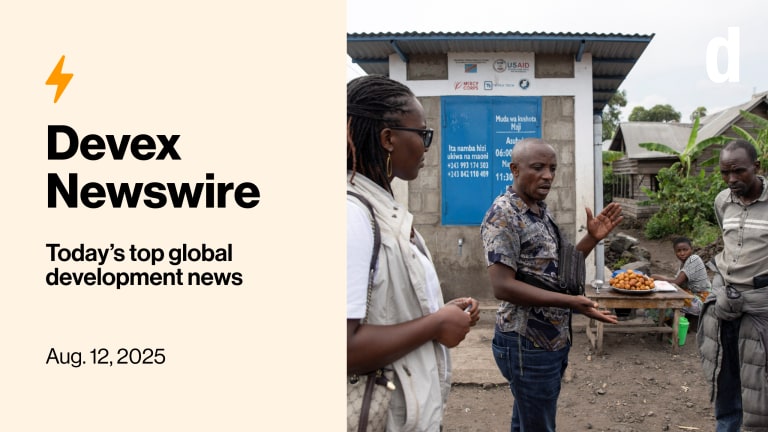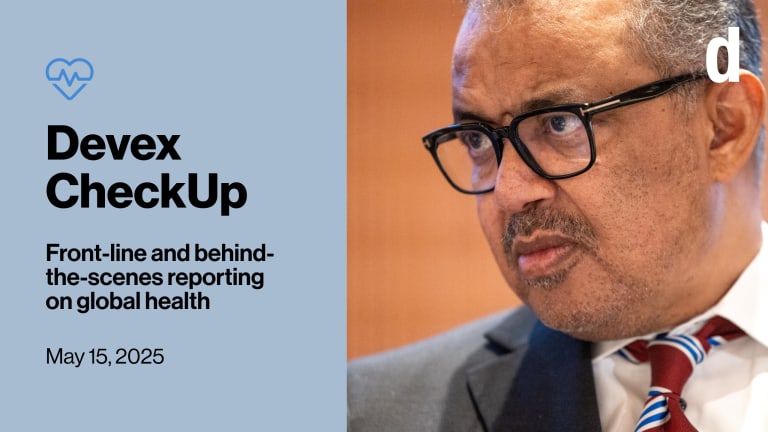Presented by The Scaling Community of Practice

We have an exclusive item on Dr. Ahmed Ogwell Ouma’s “remarkable” tenure at the Africa Centres for Disease Control and Prevention — and explain why he’s now resigned.
Also in today’s edition: We look at Australia’s efforts to stem modern-day slavery, and explain new French aid cuts.
+ Join our career event today to gain an insider’s perspective of what working in the gender equality and social inclusion space entails in the global development field, as well as the skills you need and how to overcome challenges.
Pushed out
This is a preview of Newswire
Sign up to this newsletter for an inside look at the biggest stories in global development, in your inbox daily.
In January, Devex Senior Health Reporter Sara Jerving reported on Africa CDC’s difficulty attracting and retaining staff. But the saga of Dr. Ahmed Ogwell Ouma, acting deputy director-general, could offer clues as to why.
Ouma has resigned his post effective at the end of the month. And his tenure — he joined the CDC shortly after it was established in 2019 — has been “nothing short of remarkable,” wrote Africa CDC chief Dr. Jean Kaseya in an internal email seen by Sara.
He didn’t have much choice, to be fair: He was disqualified due to African Union-set quotas that meant his job could only go to nationals of certain countries. The system is designed to increase geographical balance in recruitment, but it also left out Ouma, whose home country of Kenya didn’t make the list.
Ouma’s resignation comes during a year of transition in leadership for the Pan-African public health agency. The organization’s structure is evolving from a specialized technical institute of the AU to a public health agency — a move that gives it greater autonomy.
“His contributions have been instrumental in navigating our young organization through unprecedented times, from managing the COVID-19 challenges to laying the foundations of the continental Public Health agency leading health in Africa in line with our new mandate,” Kaseya wrote.
Exclusive: Africa CDC deputy resigns after bar on applying for own job
ICYMI: Inadequate funding strains Africa CDC's growth
+ Think you know the news? See if you can ace the questions about the top stories of the past month. Take our one-minute quiz now.
Sacre bleu
France, the fourth-largest country provider of foreign aid, has become the latest European behemoth to slash its official development aid budget by 12.5%, or €742 million (around $805.9 million). Until now, the budget had been rising since 2017 under President Emmanuel Macron.
The government has blamed the drop, which is part of a €10 billion across-the-board budget cut, on lower government revenues thanks to the “new geopolitical context” France is facing: Russia’s invasion of Ukraine, clashes in the Middle East, and slowed growth in China and Germany.
Olivier Bruyeron, president of Coordination SUD, an association representing 180 French NGOs, says the foreign aid cuts came as “a surprise to us and to everyone in the development community.” Echoing comments made by other aid leaders, he says the decision was “in complete contradiction to the statements of the [French] president,” as well as a 2021 law calling for an increase in foreign aid, and a June 2023 heads of state meeting hosted by Macron.
Read: French government criticized over $806M cut to aid (Pro)
From our archives: A primer on French aid (Pro)
+ A Devex Pro membership gives you access to all our expert analyses, insider insights, exclusive events, and more. Not a Pro member yet? Start your 15-day free trial today.
Bye-bye, banks
Four major U.S. banks departed the Equator Principles, an environmental and social standards group that improves project finance policies, especially in emerging markets.
Bank of America, Citi, JPMorgan Chase, and Wells Fargo delisted from a set of global standards that ensures projects they finance are socially responsible and have sound environmental management. The reason? Changes to governance and signatory rules. The query? What about the gold standard? The result? “A big blow to credibility.”
Those are some pretty heavy hitters, so what does that mean for the environmental group? Will other banks stick around? The voluntary move raises questions about the global standards and whether U.S. banks will continue to uphold the policies if they head for the door, writes Devex Senior Reporter Adva Saldinger.
Equator Principles declined to comment about why the banks left, instead directing Devex to the About us page on its website, which said in part: "We will enhance our reporting and disclosure requirements and strengthen our governance and accountability processes.”
In January, Equator Principles renamed itself, got a chief executive for the first time, and asked signatories to recommit to the organization and become more involved.
The organization told Adva via email that it is “disappointed that some institutions made the decision to de-list as EPFIs.” Still, it said it is “pleased” that 128 institutions worldwide will continue and expects more banks to join in 2024.
While it's unclear if banks will continue to apply the principle, Johan Frijns from BankTrack, an NGO that tracks commercial banks climate and human rights activities, speculated that the move is being driven by “fear of being perceived as operating in a coordinated way on ESG issues.”
“The consequence for us is twofold: a big blow to the credibility of the association as the global standard, gold standard,” he says, adding that “without buy-in from the large U.S. banks it’s hard to maintain knowledge and a level playing field.”
Read: Major US banks leave global environmental and social standards group
Under pressure down under
Australia has failed to prioritize fighting modern slavery and is now playing “catch up” on the issue, according to Josh Burns, a member of Parliament from the Australian Labor Party — but he maintains those concerns should not stymie greater investment in Southeast Asia from Australian firms.
“We have to make sure that Australia is reaching out and engaging with the region economically, but we have to do it in a way that respects human rights and respects people's individual rights,” the chair of the Australian parliamentary committee on human rights said during a gathering of Southeast Asian nations in Melbourne attended by Devex’s Vince Chadwick.
Kyla Raby, an anti-trafficking specialist, noted that many potential economic growth sectors for Australia in Southeast Asia, such as agriculture, manufacturing, and tourism, are high-risk areas for people trafficking and modern slavery.
Almost 50 million people lived in modern slavery in 2021, according to the International Labour Organization, including 15.1 million in the Asia-Pacific region.
Last year, the Australian Greens political party called on ALP to support a ban on the importation of goods produced with forced labor. And Raby challenged Burns at the side event over how Australia would ensure its new spending did not exacerbate modern slavery.
There are some “key areas of concern, where we are very concerned about high-risk industries and regions where modern slavery, we know, is more prevalent than others," Burns said, adding, “We know that there are not just too many examples of modern slavery in the region — it's happening in Australia as well, and we need to stamp that out as quickly as possible."
Read: Australia still 'catching up' on modern slavery fight
Background reading: Australia's new aid budget seeks to subvert China's Pacific dominance (Pro)
In other news
The European Union is preparing to call for the fossil fuel industry to contribute funds to help lower-income countries cope with climate change. [Reuters]
Australia announced a $1.3 billion fund to boost two-way investment with Southeast Asia that will focus on infrastructure and green-economy transition projects. [Nikkei Asia]
The U.S. Securities and Exchange Commission is set to vote on a landmark rule mandating companies to disclose their greenhouse gas emissions, climate risks, and strategies for transitioning away from fossil fuels. [AP News]
Sign up to Newswire for an inside look at the biggest stories in global development.




